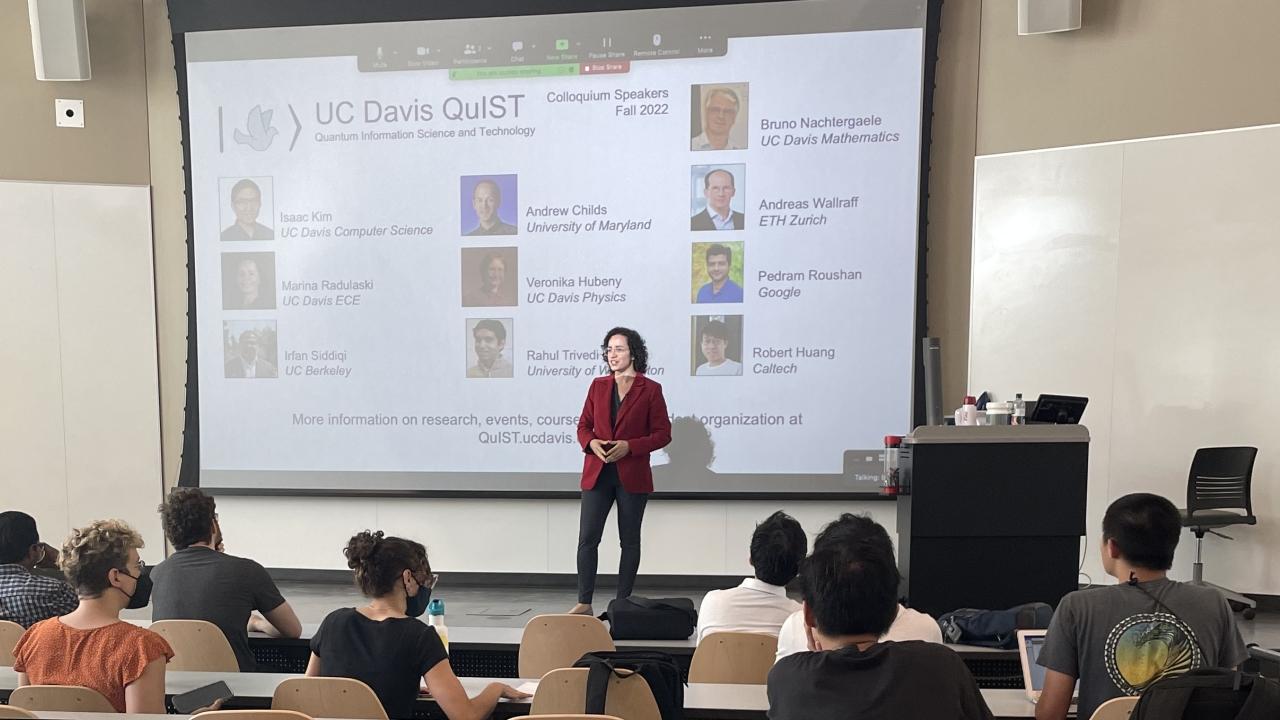
2022 QuIST Colloquium Helps Set Global Stage for Quantum Information Science at UC Davis
The University of California, Davis, is emerging as a global hub to discuss and advance the field of quantum information science.
Throughout the end of 2022, the College of Engineering funded a series of nine presentations from scholars across the globe and one professional from Google as part of its inaugural Quantum Information Science and Technology, or QuiST, Colloquium. The college recognized the effort as part of its Next Level strategic vision, which uplifts research and education that engineers a better world for all.
"UC Davis has talented quantum information researchers across its engineering and science departments," Marina Radulaski, an assistant professor of electrical and computer engineering, said. "The QuIST Colloquium enabled us to interact with world leading scientists, learn about the newest experiments, and build collaborations."
Radulaski co-created the speaker series with Assistant Professor Isaac Kim in the Department of Computer Science, underpinning the importance of an interdisciplinary approach to the QuIST Colloquium and the study of quantum information science and technology in general.
QuIST Colloquium topics included how quantum processing can discover new and solve for classically unsolvable physics problems from Google's researcher Pedram Roushan, as well as a demonstration that non-locality, a theory that states an observer can impact two or more distant systems simultaneously, is a viable resource for quantum information science from Andreas Wallraf, a full professor of solid state physics at ETH Zürich.
"Through this series, students were presented with a modern curriculum and networking opportunities in a growing research area of national interest," Radulaski said.
To humanize the quantum field
Before each presentation, attendees could socialize with one another at pre-colloquium receptions. These gatherings shined a light on the human-aspect powering quantum information science.
"Some of the most valuable conversations I remember having were what led individuals into quantum information science," said Eliana Mann, an undergraduate physics senior and the financial officer for QCaD, a quantum computing group at UC Davis. "It was remarkable to see what a diverse range of people were drawn to QuIST."
Victoria Norman, a Ph.D. student in the R-Lab within the Department of Electrical and Computer Engineering, shared similar thoughts about the dedicated student lunches held with each speaker.
"We were privileged to have informal conversations with significant people in quantum information from across the world," Norman said.
She particularly noted how students were able to speak with Roushan to learn his views on the differences between academic research and work in the quantum information industry.
Radulaski explained that both of these interactive sessions were key to one of the series' main goals: to build a sense of community within QuIST research groups at UC Davis.
Further(ing) computational power
Within the past six months, UC Davis researchers have received significant awards and grants to fund their quantum information science research projects, such as the University of California's 2023 Multicampus Research Programs and Initiatives and 2022 UC Partnerships in Computational Transformation, as well as the Young Investigator Grant from the Air Force Office of Scientific Research.
Recent hires in the college also bolster the university’s academic rigor in the field of quantum information science, like Radulaski and Kim. However, they're not alone.
Others include Professor Jeremy Munday and Assistant Professor William Putnam, both in the Department of Electrical and Computer Engineering. In total, four new faculty members with QuIST-related research have joined the College of Engineering in as many years.
"Our drive for excellence in research has been recognized through national agency and industry support, while our commitment to building a strong and diverse quantum pipeline has been reflected in the development of a modern quantum information curriculum with six new courses for undergraduate and graduate students," Radulaski said.
To learn more about the UC Davis QuIST community, from its offered courses to upcoming events, check out its website.
Weren’t able to make the colloquia?
The full list of speakers for the 2022 QuIST Colloquium series includes Bruno Nachtergaele, Department of Mathematics at UC Davis; Isaac Kim, Department of Computer Science at UC Davis; Andrew Childs, Department of Computer Science at the University of Maryland; Andreas Wallraff, Department of Physics at ETH Zurich; Marina Radulaski, Department of Electrical and Computer Engineering at UC Davis; Veronika Hubeny, Department of Physics at UC Davis; Pedram Roushan, Google; Irfan Siddiqi, UC Berkeley Physics; Rahul Trivedi, Department of Electrical and Computer Engineering at University of Washington.